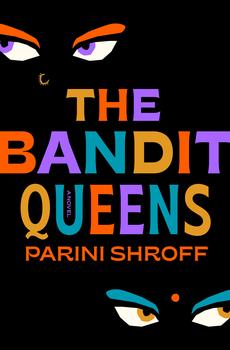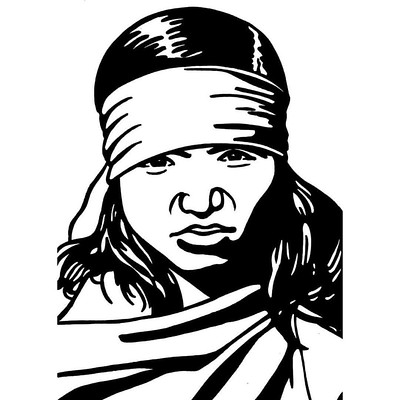Summary | Excerpt | Reading Guide | Discuss | Reviews | Beyond the Book | Read-Alikes | Genres & Themes | Author Bio

A Novel
by Parini ShroffThis article relates to The Bandit Queens
 In Parini Shroff's The Bandit Queens, Phoolan Devi (pronounced POOH-lann DAY-vee) is a feminist symbol of strength, poise and honor to abused women, her portrait hung high in main character Geeta's home. Devi, known as India's "Bandit Queen," is the only real-world figure highlighted throughout the novel. So who exactly was she?
In Parini Shroff's The Bandit Queens, Phoolan Devi (pronounced POOH-lann DAY-vee) is a feminist symbol of strength, poise and honor to abused women, her portrait hung high in main character Geeta's home. Devi, known as India's "Bandit Queen," is the only real-world figure highlighted throughout the novel. So who exactly was she?
Devi was born on August 10, 1963 in a small rural village, Ghura Ka Purwa. She was Nishad, a sub-caste of the Mallah caste that has been socially and economically aligned with Dalits, those derogatorily known as "untouchables." Despite growing up in abject poverty and in a patriarchal society, Devi stood up for herself and was notoriously outspoken from a young age — she was not happy about the control men often assumed over her. Many of the details of her early life are unclear or disputed, but according to some accounts, after her paternal grandfather's death, a male cousin made executive decisions on how to curate the very little farmland left to the family, and she responded by publicly berating him and staging a dharna (sit-in) on the land. Shortly following that incident, her family arranged for her to marry a man three times her age. She was 11 years old.
Throughout her marriage, she experienced physical, verbal and sexual abuse. After countless attempts to run away, she was returned to her family. As a wife leaving her husband was considered disgraceful, she was shunned for her actions and spent her teenage years as a social outcast. She eventually became part of a band of dacoits (bandits), who robbed wealthy surrounding areas, though it is not clear whether she was kidnapped or joined willingly.
For years onward in her life as a dacoit, Devi would experience rape and abuse from men who dehumanized her as a lower-caste woman, including the gang leader, Babu Gujjar. She is said to have become romantically involved with Vikram Mallah, a man from her own caste and the band's second-in-command, after he avenged her by killing Gujjar. Following a later gang dispute between members of different castes that led to Vikram's murder, Devi was captured by the victorious gang members and taken to the village of Behmai, where she was raped by several upper-caste Thakur men. After escaping this situation, Devi joined forces with other Mallah members of the gang, and eventually led her own gang composed entirely of Mallahs.
Devi's ensuing fame and the nickname Bandit Queen can be attributed to the 1981 Valentine's Day Behmai Massacre, in which, according to The Times of India, she "gunned down as many as 20 Thakurs...to avenge her rape." Vikram is said to have told Devi, "If you are going to kill, kill twenty, not just one. For if you kill twenty, your fame will spread; if you kill only one, they will hang you as a murderess."
In fact, Devi did earn a reputation as a Robin Hood figure and an underdog, which glorified her among the lower castes and gave her public sympathy and support. Following the massacre, Devi evaded police for two years before turning herself in. After she had been imprisoned for 11 years, the government made the controversial decision to drop the charges against her and release her on parole.
Devi then pivoted her fight against injustice, throwing herself into Indian politics and serving as a Member of Parliament for two years. Finally, people were able to see her as someone who showed strength without the use of brutal force, as a mouthpiece for political change. In July 2001, at the age of 37, Devi was shot dead outside of her home in New Delhi by three men believed to have acted in revenge for the 1981 massacre.
Devi's tumultuous life story is as tragic as it is compelling, and how the world should remember her is a complicated question. As writer Katie Presley summarized in an article for Bitch Media, "As a Parliamentarian, she fought for women's rights, an end to child marriage, and the rights of India's poor. In a Che Guevara-type revision of history, though, Devi is remembered as a romantic Robin Hood figure, robbing the rich to help the poor, and not as a politician working to enact structural change in India's social hierarchies." Regardless of how you choose to remember her, Phoolan Devi's legacy will live on for decades to come.
An illustration of Phoolan Devi, via dignidadrebelde (CC BY 2.0)
Filed under People, Eras & Events
![]() This "beyond the book article" relates to The Bandit Queens. It originally ran in March 2023 and has been updated for the
January 2024 paperback edition.
Go to magazine.
This "beyond the book article" relates to The Bandit Queens. It originally ran in March 2023 and has been updated for the
January 2024 paperback edition.
Go to magazine.
The library is the temple of learning, and learning has liberated more people than all the wars in history
Click Here to find out who said this, as well as discovering other famous literary quotes!
Your guide toexceptional books
BookBrowse seeks out and recommends the best in contemporary fiction and nonfiction—books that not only engage and entertain but also deepen our understanding of ourselves and the world around us.